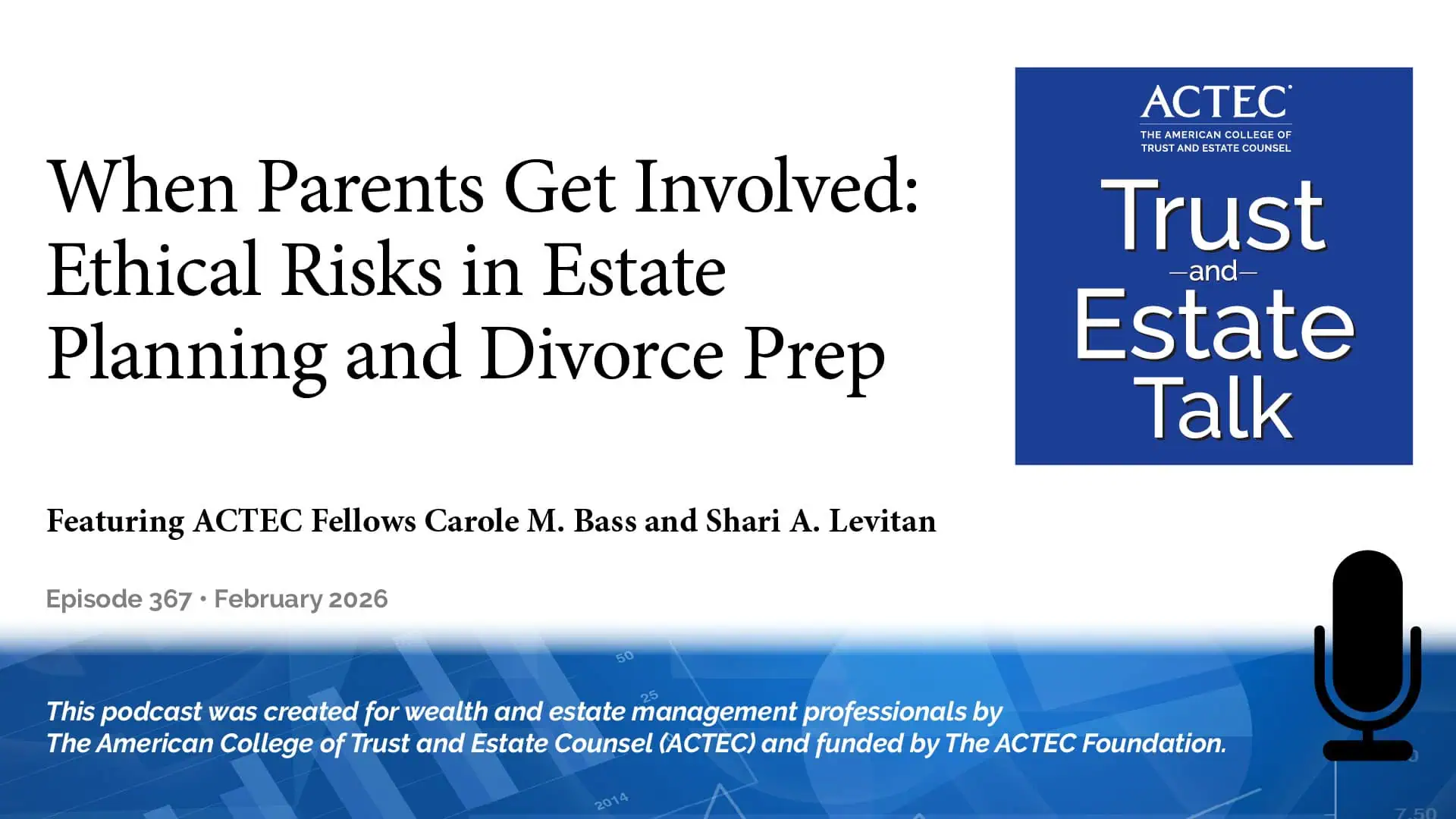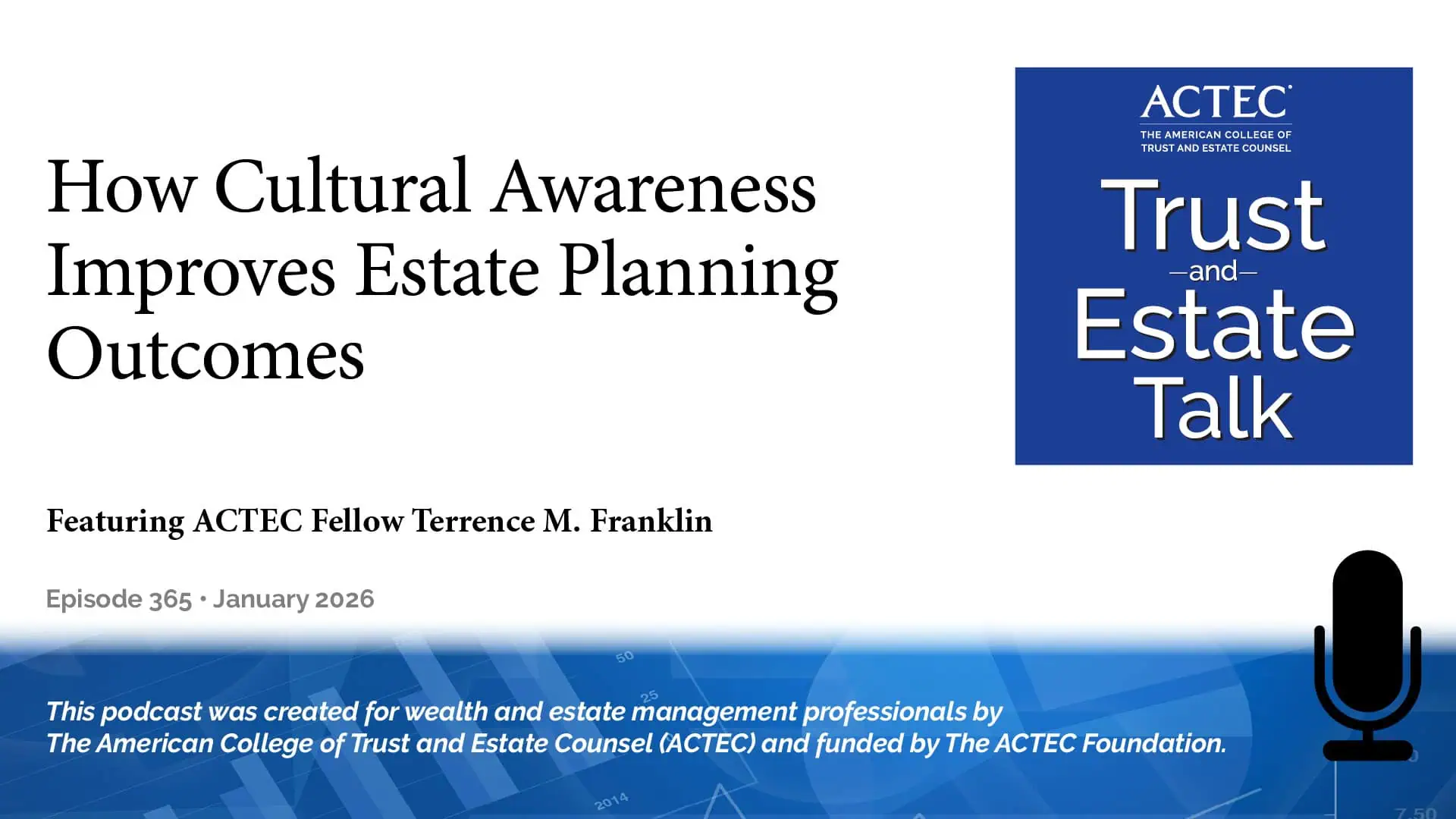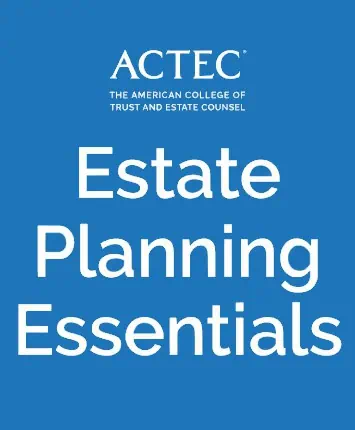Guiding Trust and Estate Disputes to Settlement
“Guiding Trust and Estate Disputes to Settlement,” that’s the subject of today’s ACTEC Trust and Estate Talk.”
Transcript/Show Notes
Introduction to Settling Trust and Estate Disputes
This is Toni Ann Kruse, ACTEC Fellow from New York City.
Special challenges tend to arise when settling trust and estate controversy. What should estate planners and litigators keep in mind to position the disputes for settlement and make sure their settlements stick?
ACTEC Fellows David Blickenstaff of Chicago, Illinois, Margaret Sager of Philadelphia, Pennsylvania, and Philip C. Corbo of Morristown, New Jersey join us today to discuss this topic and offer advice on how to help clients settle trust and estate controversies as smoothly and efficiently as possible. Welcome!
Special Challenges in Trust and Estate Controversies
David Blickenstaff: Thank you, Toni Ann. This is Dave, and I will start with an overview of how we as lawyers can help position disputes for settlement. Then Margaret and Phil are going to discuss two substantive areas we need to keep in mind if we want our settlements to stick.
Positioning Disputes for Settlement
I think we all understand why it’s almost always better for clients to settle than to duke it out in court, but that doesn’t mean it’s easy to reach an agreement. Trust and estate disputes are especially hard to settle. A few reasons, multiple parties, not just A versus B, but possibly an alphabet soup of multiple parties with competing interests, which means more people who have to agree on a solution.
There’s usually an emotional component. Control is especially important. Emotions can matter more than money, and they make it harder to reach a rational resolution. These cases also often involve abundant war chests. Some of the people involved can afford to fight indefinitely and don’t have an economic incentive to settle the way a regular person might.
Margaret will explain that our settlements often have tax implications that you wouldn’t encounter in typical litigation, which is another complication.
So how do we help our clients overcome these obstacles and get to the finish line?
Recommendations to Facilitate Trust and Estate Dispute Settlement
First, set expectations early. Sometimes clients seem to think the lawyer or the court can put Humpty Dumpty back together again and make it all right. That’s not going to happen. Make clear to them what’s really on the menu. Usually, it’s a choice between two or more or less than ideal outcomes. And the sooner that suit sinks in, the better.
Explain the risks, not only the risk of losing but also the financial and emotional costs of playing the game. The financial costs include the possibility of paying the other side’s legal fees as well as your own.
Make sure everyone’s at the table. As Phil will explain, the last thing you want is to cut a deal and have it undone later because not everyone who needed to participate was there.
Encourage transparency. In our cases, usually, someone has more information than someone else, which makes it harder to reach a deal because people who are in the dark assume the worst. Level that information playing field.
You want to pick the right time. Sometimes you need to wait until information is provided. Sometimes people just need to have their day in court, whether that day in court is actually in court or is in a deposition or a mediation where they get to say their piece and be heard.
And finally, pick the right mechanism. Can the lawyers help the clients work it out before a lawsuit is filed? Sometimes. Would an independent mediator help break the law jam? Is this a situation where someone really wants to burn the house down and you need the structure of a court proceeding and an adult in the room to force progress? All those things are things to consider on the front end.
The fact that trust and estate disputes are especially hard to resolve makes the lawyers’ role as problem solvers all the more important. If you stick with it, even the most challenging cases will usually get there someday. With that, let me turn it over to Margaret to talk about tax considerations.
Tax Exposures in Trust and Estate Settlements
Margaret Sager: Thank you, Dave. Some settlements in will or trust disputes involve tax consequences that you want to achieve as part of the settlement, which is great and it’s intentional. But what strikes fear in the heart of many of us in a settlement is that there may be unwanted or unintended negative tax consequences that are not anticipated, especially in a family settlement situation, the IRS might be especially suspicious that the quote settlement is not a real dispute, but a sweetheart deal to get some benefit to the collective family.
On the tax issues, there are four primary tax exposures to consider in the setting.
T&E Estate Tax Issues
One is estate tax. For example, especially if a party is the settler of a trust, there may be 2036 or 2038 issues involving retained rights, retained benefits.
T&E Gift Tax Issues
There are also the risk of gift tax issues. In pretty much every settlement, the parties are giving something up. The question is whether a party is giving up something that the IRS could deem to be a gift to another party. This can occur not only from entering into an agreement and approving the settlement but also from declining to object to a settlement or resolution. For example, if a petition is filed with the court to approve the settlement.
T&E Income Tax Issues
There can be income tax issues. This is particularly relevant if there is a sale or exchange involved in the settlement that could be viewed as a realization event, possibly causing tax on capital gains.
Generation-Skipping Transfer Tax (GSTT) Issues
Finally, there are considerations of generation-skipping tax. This is particularly relevant in a case of a settlement involving a generation-skipping tax-exempt trust and can involve blowing that GST exemption status and/or incurring GST tax.
CCA2023522018
I note that at Christmas time, the IRS gave us a little gift, a CCA 202352018. In that CCA, which is a Chief Counsel Advice (CCA), which gives guidance to the field and essentially shows the IRS’s litigation posture on a matter. In that CCA, the IRS reversed its position in a prior private letter ruling issued in 2016 in a similar fact pattern. In the CCA, a grantor trust was modified by judicial modification to give the trustee discretionary power to reimburse the grantor for any income taxes the grantor paid as a result of the inclusion of the trust’s income in the grantor’s taxable income. Now, this was the grant of a discretionary power to the trustee, so no guarantees to the grantor.
All of the beneficiaries consented to the modification. The IRS took the position that the beneficiaries made a gift to the settler of their interest in income and principal because the settler benefited. How that gift would be valued is a different and interesting question that was not addressed. However, right or wrong, the CCA may indicate that the IRS is waking up to these settlement tax issues and so we need to be aware and on guard. And I will just comment that a settlement can just be a settlement, but a settlement might also be a trust modification, a reformation, change of situs, and so forth. These types of agreements can also qualify broadly as a settlement agreement.
Of course, no settlement agreement will hold up if not all the parties are on board. Virtual representation is in particular a challenge, and on that topic, I turn this over to Phil Corbo.
Binding Agreements and Virtual Representation
Binding Trust and Estate Agreements
Philip Corbo: Thank you, Margaret. The purpose of the settlement is to bind all parties. The first step is to identify all parties with an interest. These parties include fiduciaries, current beneficiaries, remainder beneficiaries, and contingent beneficiaries.
Challenges arise when parties refuse to participate, cannot be located, or suffer from a disability such as being a minor. In dealing with these challenges, it is important to engage in a deep dive on the law of the jurisdiction governing your matter. This includes court rules, case law, and statutes including the Uniform Trust Code (UTC) in jurisdictions where it has been adopted.
The key to binding parties who refuse to participate is making sure that they receive proper notice of the proceedings in accordance with the governing law. There are numerous cases dealing with non-participating parties and you will find that the cases holding that the non-participating parties are not bound by the settlement, whether in or out of court, are situations where the non-participating parties were not given proper notice in accordance with the local law.
Virtual Representation in Trust and Estate Law
Another key aspect in binding all necessary parties is focusing on virtual representation. Virtual representation is the ability for one individual to represent another either in court or non-judicially where direct representation is not feasible. Examples of virtual representation include: parents representing minor children, fiduciaries representing beneficiaries, and holders of powers of appointment representing permissible appointees of the power.
Again, it is crucial to focus on local law including the Uniform Trust Code where applicable. A key aspect for virtual representation to be effective is that there is no conflict of interest between the individual doing the representing and the person being represented.
Independent Counsel in T&E Disputes
Another important factor in having an enforceable settlement agreement is binding parties not represented by counsel. Oftentimes, an interested party does not see the need or does not want to bear the expense of engaging an attorney.
All parties to a settlement should be advised in writing of the right to obtain independent counsel. It is good practice to have your settlement agreements identify parties along with their counsel and for parties who refuse to engage counsel, the agreement should state that they have been advised of their right and have expressly declined to do so.
Finally, for settlements out of court, thoughtful consideration should be given to whether obtaining court approval is prudent. Generally, court orders approving settlement agreements have the force of a judgment. In a litigated matter, the best practice is to have the court approve the settlement which the court can then enforce.
Toni Ann Kruse: Thank you, David, Phillip, and Margaret for this interesting discussion on settling trust and estate disputes.
Additional Resources
- Tips Regarding Fiduciary Disputes and Estate Planning (May 2024)
- Navigating Unique Issues in the Settlement of Trust and Estate Disputes (Feb 2024)
- For Clients: Inheritance and Estate Settlement: When Will I Get My Money (video, Nar 2021)
Latest ACTEC Trust and Estate Talk Podcasts

When Parents Get Involved: Ethical Risks in Estate Planning and Divorce Prep
When parents join prenup or divorce planning, ethical risks follow. ACTEC Fellows explore privilege, conflicts, and protecting the attorney-client relationship.

Useful But Overlooked Trusts: A Planner’s Guide to When and How to Use Them
Explore overlooked trusts—including HEETs, alimony, voting, and blind trusts—and when estate planners should use them to address complex client needs.

How Cultural Awareness Improves Estate Planning Outcomes
How cultural awareness improves estate planning outcomes, with insights on the racial wealth gap and strategies for more effective, inclusive client guidance.



